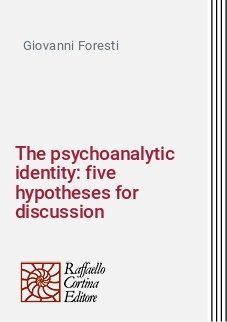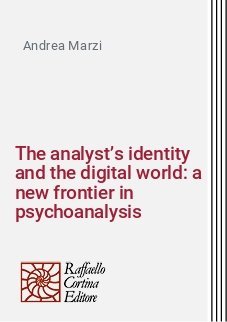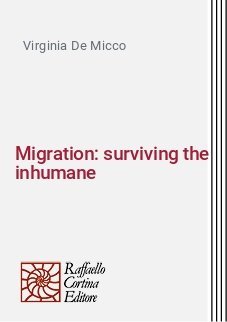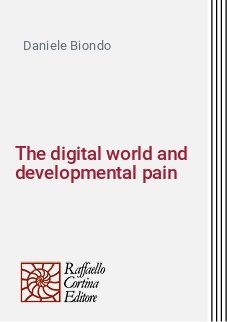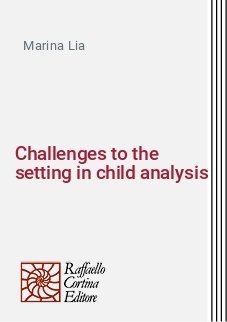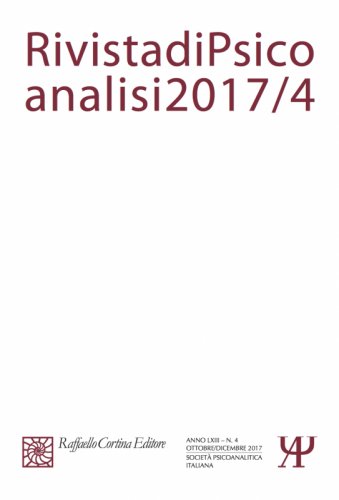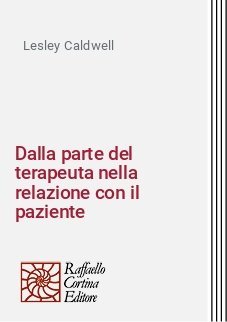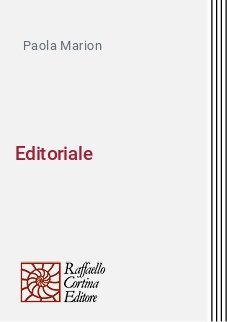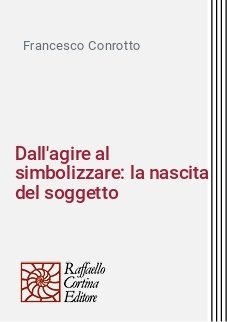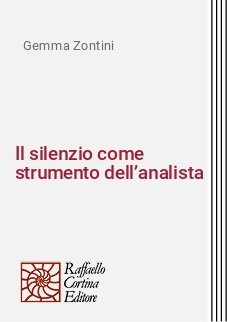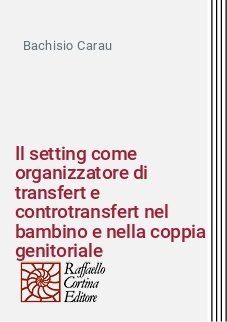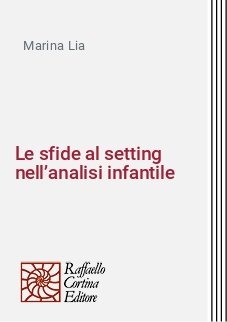Raffaello Cortina Editore
The psychoanalytic identity: five hypotheses for discussion
rivista: La Rivista di Psicoanalisi
fascicolo: The Italian Psychoanalytic Annual 2018/12
di Giovanni Foresti
In this paper, psychoanalytic identity is discussed in reference to five hypotheses. The first is that identity may be a logical and biological function that depends on the systems of difference that define it. The second is that it may be constituted as a permanent paradox: a paradox, that is, that can never be definitively resolved. The third is that the logic of the paradox tends to be denied, even though it is very much present in the foundational texts of psychoanalysis. The fourth is that psychoanalytic identity is not only the product of formal training, but must also be understood as the objective of the psychoanalyst’s ongoing development. The fifth is that the operative work of psychoanalytic institutions should aim at facilitating the necessary openness to identity formation, while numerous group and individual phenomena tend to hinder the psychosocial work that would be necessary.
Keywords: Binocular vision, identity, paradox,psychoanalytic training.
L’identità psicoanalitica: cinque ipotesi per un dibattito. In questo lavoro l’identità psicoanalitica viene discussa ricorrendo a cinque ipotesi. La prima è che l’identità sia una funzione logica e biologica che dipende dai sistemi di differenze che la definiscono. La seconda è che si costituisca come un paradosso permanente: un paradosso, cioè, che non può venir mai definitivamente risolto. La terza è che la logica del paradosso tende a essere negata, anche se è ben presente nei testi fondanti della psicoanalisi. La quarta è che l’identità psicoanalitica non è solo il prodotto del training, ma dev’essere intesa anche come l’obiettivo della formazione permanente dello psicoanalista. La quinta è che il funzionamento delle istituzioni psicoanalitiche dovrebbe mirare a facilitare la necessaria apertura identitaria, mentre numerosi fenomeni gruppali e individuali tendono a ostacolare il lavoro psicosociale che sarebbe necessario.
Parole chiave: Identità, paradosso, training psicoanalitico, visione binoculare.
L’identité psychanalytique: cinq hypothèses de débat. Dans ce travail, l’identité psychanalytique est discutée en recourant à cinq hypothèses. La première est que l’identité est une fonction logique et biologique qui dépend des systèmes de différences qui la définissent. La seconde est qu’elle se constitue comme un paradoxe permanent: un paradoxe, à savoir, qui ne peut jamais être définitivement résolu. La troisième est que la logique du paradoxe tend à être niée, même si elle est clairement présente dans les textes fondateurs de la psychanalyse. La quatrième est que l’identité psychanalytique est non seulement le produit du training, mais elle doit être comprise comme l’objectif de la formation continue du psychanalyste. La cinquième est que le fonctionnement des institutions psychanalytiques devrait viser à faciliter la nécessaire ouverture identitaire, tandis que de nombreux phénomènes groupales et individuels ont la tendance à entraver le travail psychosocial qui serait nécessaire.
Mots-clés: Identité, paradoxe, training psychanalytique, vision binoculaire.
La identidad psicoanalítica y sus paradojas: cinco hipótesis para un debate. En este trabajo se discute en torno a la identidad psicoanalítica a partir de cinco hipótesis. La primera es que la identidad es una función lógica y biológica que depende de los sistemas de diferencias que la definen. La segunda es que se constituye como una paradoja permanente: una paradoja, es decir, que nunca puede resolverse definitivamente. La tercera es que la lógica de la paradoja tiende a ser negada, aunque está presente en los textos fundadores del psicoanálisis. La cuarta es que la identidad psicoanalítica no es solo el producto del entrenamiento, sino que tiene que entenderse también como el objetivo de la formación permanente del psicoanalista. La quinta es que el funcionamiento de las instituciones psicoanalíticas debería apuntar a facilitar la necesaria apertura identitaria, mientras numerosos fenómenas grupales e individuales tienden a obstaculizar el trabajo psicosocial que sería necesario.
Palabras clave: Entrenamiento psicoanalítico, identidad, paradoja, visión binocular.
Die psychoanalytische Identität: Fünf Hypothesen zur Debatte. In dieser Arbeit wird anhand von fünf Hypothesen die psychoanalytische Identität erörtert. Die erste ist, dass die Identität eine logische und biologische Funktion ist, die von den Unterschieden der Systeme, die sie definieren, abhängig ist. Die zweite ist, dass sie sie als dauerhafte Paradoxie bildet: D. h. eine Paradoxie, die nie endgültig gelöst werden kann. Die dritte ist, dass die Logik der Paradoxie zur Leugnung zu neigen scheint, obwohl sie eindeutig in den Gründungstexten der Psychoanalyse vorhanden ist. Die vierte ist, dass die psychoanalytische Identität nicht nur das Produkt der psychoanalytischen Ausbildung ist, sondern sie soll auch als Ziel der fortdauernden Weiterbildung des Psychoanalytikers verstanden werden. Die fünfte ist, dass die Arbeitsweise der psychoanalytischen Institutionen das Ziel haben sollte, die notwendige Identitätsöffnung zu erleichtern, während zahlreiche Einzel - und Gruppenphänome dazu tendieren, die psychosoziale Arbeit zu verhindern, die notwendig wäre.
Schlüsselwörter : Binokularsehen, Identität, Paradoxie, psychoanalytische Ausbildung.
The analyst’s identity and the digital world: a new frontier in psychoanalysis
rivista: La Rivista di Psicoanalisi
fascicolo: The Italian Psychoanalytic Annual 2018/12
di Andrea Marzi
It is undeniable that the digital world invites in-depth studies of psychoanalysis itself and of the virtual spaces of the mind. all this pertains to the patient who brings «computerized» baggage into the session, but also to the analyst, who is subjected to currents that intensely stimulate his preexisting frames of reference, reinforcing his identity. trying to better understand this latter condition requires first examining the definition of the analyst’s identity and then the nature of virtual reality, with its impact on the psychoanalytic field and on the analyst’s identity itself, seeking possible integration. some clinical illustrations are used in an attempt to deepen the field of reflection on this topic – not only in general, but also in regard to the frontier of distance analysis.
keywords: Analyst’s identity, cyberspace, clinical psychoanalysis, computerization, distance analysis, identity, psychoanalysis, tele-analysis, virtual reality.
Identità dell’analista e mondo digitale: una nuova frontiera della psicoanalisi. È innegabile che il mondo digitale stimoli approfondimenti sulla psicoanalisi stessa e sugli spazi virtuali della mente. Tutto questo riguarda il paziente che porta un bagaglio «informatico» nella seduta, ma anche l’analista, sottoposto a correnti che fortemente sollecitano le sue precedenti coordinate di riferimento, cimentandone l’identità. Cercare di comprendere meglio quest’ultima condizione richiede che ci si addentri prima nella definizione della identità dell’analista, poi nella natura della realtà virtuale, con le sue conseguenze nel campo psicoanalitico e sull’identità stessa dell’analista, cercando una possibile integrazione. Alcune illustrazioni cliniche si sforzano di approfondire il campo di riflessione su questo tema , non solo in linea generale, ma anche riguardo alla frontiera dell’analisi remota.
Parole Chiave: Analisi remota, cyberspace, clinica psicoanalitica, identità, identità dell’analista, informatica, psicoanalisi, realtà virtuale, teleanalisi.
Identité de l’analyste et monde numérique: une nouvelle frontière de la psychanalyse. Il est indéniable que le monde numérique stimule des approfondissements sur la psychanalyse elle-même, et sur les espaces virtuels de l’esprit. Tout cela concerne le patient qui apporte un bagage «informatique» dans la séance, mais l’analyste aussi, pressé par des courants qui sollicitent fortement ses précédentes coordonnées de référence, en en stressant l’identité. Essayer de mieux comprendre cette dernière condition exige que nous examinons préalablement la définition de l’identité de l’analyste, et ensuite la nature de la réalité virtuelle, avec ses conséquences dans le champ psychanalytique et sur l’identité même de l’analyste, en cherchant une possible intégration. Certaines illustrations cliniques visent à approfondir le champ de réflexion sur cette question, non seulement en général, mais aussi par rapport à la frontière de l’analyse à distance.
Mots-clés: Analyse à distance, cyberespace, clinique psychanalytique, identité, identité de l’analyste, informatique, psychanalyse, réalité virtuelle, télé-analyse.
Identidad del analista y mundo digital: una nueva frontera del psicoanálisis. Es innegable que el mundo digital estimula la profundización sobre el psicoanálisis mismo y sobre los espacios virtuales de la mente. Todo esto tiene que ver con el paciente que lleva un bagaje «informático» a la sesión, pero también con el analista, sujeto a corrientes que solicitan con fuerza sus precedentes puntos de referencia, poniendo a prueba la identidad. Tratar de comprender mejor esta última condición exige que entremos primero en la definición de identidad del analista, luego en la naturaleza de la realidad virutual con sus consecuencias en el campo psicoanalítico y en la identidad misma del analista, buscando una posible integración. Algunas ilustraciones clínicas se esfuerzan en profundizar el campo de reflexión sobre este tema, no solo en línea general, sino también respecto a la frontera del análisis remoto.
Palabras Clave: Anàlisis a distancia, ciberespacio, clinica psicoanalítica, identidad, identidad del analista, informàtica, psicoanàlisis, realidad virtual, teleanàlisis.
Die Identität des Analytikers und die digitale Welt: Eine neue Grenze der Psychoanalyse. Es ist unbestreitbar, dass die digitale Welt Vertiefungen über die Psychoanalyse selbst und über die virtuellen Räume der Psyche anregt. Das betrifft nicht nur den Patienten, der eine Fülle an «Computerwissen» in die Sitzung bringt, sondern auch den Analytiker, der unter Strömungen steht, die stark in seine früheren Referenzkoordinaten eindringen und seine Identität auf die Probe stellen. Der Versuch, den letztgenannten Zustand besser zu verstehen, erfordert, dass wir zuerst die Definition der Identität des Analytikers anschauen, dann die Art der virtuellen Realität, mit ihren Folgen auf dem Gebiet der Psychoanalyse und auf die Identität des Analytikers selbst, um eine mögliche Integration zu versuchen. Am Beispiel einiger klinischer Fälle wird sich bemüht, den Reflexionsbereich dieses Themas zu vertiefen, nicht nur im Allgemeinen, sondern auch in Bezug auf die Grenze der Fernanalyse
Schlüsselwörter: Cyberspace, Computerwesen, Fernanalyse, Identität, Identität des Analytikers, Psychoanalyse, psychoanalytische Klinik, Tele-Analyse, Virtuelle Realität.
Migration: surviving the inhumane
rivista: La Rivista di Psicoanalisi
fascicolo: The Italian Psychoanalytic Annual 2018/12
di Virginia De Micco
Starting from dramatic experiences connected to the most recent migratory waves, the ways with which the psyche reacts to such massive identity trauma are analyzed – ways that involve not only individuals, but also the groups to which they belong and their own symbolic-cultural structures that allow individuals to speak of themselves as, and to feel themselves to be, «human». In particular, the modalities are examined by which traumatic footprints «survive» in the psyche, as well as the effects that such «survival» has in transgenerational transmission and the therapeutic task of working through to which they can be directed.
Keywords: Human/inhumane, migrations, psychic survival.
Migrare: sopravvivere al disumano. A partire dalle drammatiche esperienze legate alle più recenti ondate migratorie vengono analizzate le modalità con cui la psiche reagisce a tali massicci traumi identitari, i quali coinvolgono non solo i singoli ma anche i loro gruppi di appartenenza e le stesse strutture simbolico-culturali che consentono agli individui di dirsi e di sentirsi «umani». Vengono esaminate in particolare le modalità con cui le tracce traumatiche «sopravvivono» nella psiche, gli effetti che tali «sopravvivenze» hanno nella trasmissione transgenerazionale e il lavoro terapeutico di elaborazione a cui possono andare incontro.
Parole Chiave: Migrazioni, sopravvivenze psichiche, umano/disumano.
Migrer: survivre a l’inhumain. À partir des expériences dramatiques liées aux dernières vagues migratoires, on examine la façon dont la psyché réagit à de tels traumatismes identitaires massifs, qui impliquent non seulement les individus, mais aussi leurs groupes d’appartenance et les mêmes structures symboliques-culturelles qui permettent aux individus de dire et se sentir «humains». En particulier, on examine les modes de survie des traces traumatiques dans la psyché, les effets que ces «survivances» ont sur la transmission transgénérationnelle, et le travail d’élaboration thérapeutique qu’ils peuvent rencontrer.
Mots-clés: Humain/inhumain, migrations, survivances psychiques.
Migrar: sobrevivir a lo inhumano. A partir de las dramáticas experiencias de las olas de inmigración más recientes, se analizan las modalidades con la que la psique reacciona frente a estos masivos traumas identitarios que incluyen no solamente a las personas, sino también a los grupos correspondientes y a las mismas estructuras simbólico-culturales que permiten a las personas nombrar y sentirse «humanas». Se analizan especialmente las formas en las que las huellas traumáticas «sobreviven» en la mente, los efectos que estas «pervivencias» tienen en la trasmisión trans-generacional y en el trabajo terapéutico de procesamiento que las personas pueden enfrentar.
Palabras clave: Humano/inhumano, migraciones, sobrevivencia psíquica.
Migrieren: unmenschliches Überleben. Aus den dramatischen Erfahrungen im Zusammenhang mit den letzten Migrationswellen wird analysiert, wie die Psyche auf solche massiven Identitätstraumatisierungen reagiert, die nicht nur Einzelpersonen, sondern auch ihre zugehörigen Mitgliedsgruppen und die symbolisch-kulturellen Strukturen verwickeln, die es den Individuen ermöglichen, «menschlich» zu sprechen und sich zu fühlen. Insbesondere werden die Wege untersucht, in denen traumatische Spuren in der Psyche «überleben», welche Auswirkungen diese «Überlebenden» auf die transgenerationale Übertragung und die therapeutische Verarbeitungsarbeit haben, denen man begegnen kann.
Schlüsselwörter: Menschlich/unmenschlich, migrationen, Psychische Überlebende.
The digital world and developmental pain
rivista: La Rivista di Psicoanalisi
fascicolo: The Italian Psychoanalytic Annual 2018/12
di Daniele Biondo
Technology can be used by adolescents to substitute for the construction of gender identity (the realm of escape) or to block acquiring generational identity (realm of omnipotence). The current challenge that the psychoanalyst who treats adolescents must confront is how to utilize technology as a creative resource for the process of subjectivization of adolescent patients, and how to use it as a therapeutic resource to withstand intergenerational pain and developmental pain. What it is important to observe is the use that adolescents make of the medium: a use aimed at representing their own developmental pain, but with more or less developed forms that oscillate between hallucination and representation. The author presents three clinical cases of adolescents who exemplify different representative modalities in the use of technology.
Keywords: Adolescence, developmental pain, intergenerational pain, representation, technology, virtual/digital reality.
Mondo digitale e dolore evolutivo. La tecnologia può essere utilizzata dagli adolescenti per surrogare la costruzione dell’acquisizione dell’identità di genere (registro della fuga) o per bloccare l’acquisizione dell’identità generazionale (registro dell’onnipotenza). La sfida attuale a cui è chiamato lo psicoanalista di adolescenti è quella di riuscire ad utilizzare la tecnologia come una risorsa creativa per il processo di soggettivazione dei pazienti adolescenti, nonché come una risorsa terapeutica per fronteggiare il dolore intergenerazionale e il dolore evolutivo. Ciò che è importante osservare è l’uso che gli adolescenti fanno del medium: un uso che può essere teso a rappresentare il proprio dolore evolutivo, seppur con forme più o meno evolute che oscillano dall’allucinazione alla figurazione. L’Autore presenta tre casi clinici di adolescenti che esemplificano modalità rappresentative diverse nell’uso della tecnologia.
Parole Chiave: Adolescenza, dolore evolutivo, dolore intergenerazionale, rappresentazione, realtà virtuale/digitale, tecnologia.
Monde digital et douleur évolutive. La technologie peut être utilisée par les adolescents pour substituer la construction de l’acquisition de l’identité (registre de la fuite), ou pour bloquer l’acquisition de l’identité générationnelle (registre de l’omnipotence). Le défi actuel auquel est appelé le psychanalyste des adolescents, est d’être en mesure d’utiliser la technologie comme une ressource créative pour le processus de subjectivation des patients adolescents, ainsi qu’une ressource thérapeutique pour traiter la douleur entre les générations et la douleur évolutive. Ce qui est important à noter est l’utilisation que les adolescents font du medium: une utilisation qui tend à représenter leur douleur évolutive, si bien avec des formes plus ou moins évoluées, allant de l’hallucination à la figuration. L’auteur présente trois cas d’adolescents qui illustrent de différents modes de représentation dans l’utilisation de la technologie.
Mots-Clés: Adolescence, douleur évolutive, douleur intergénérationnelle, réalité virtuelle / digitale, représentation, technologie.
Mundo digital y dolor evolutivo. La tecnología puede ser utilizada por los adolescentes para sustituir la construcción de la adquisición de la identidad de género (registro de la fuga) o para bloquear la adquisición de la identidad generacional (registro de la omnipotencia). El reto actual al que está llamado el psicoanalista de adolescentes es el de lograr usar la tecnología como recurso creativo para el proceso de subjetivación de los pacientes adolescentes, y también como recurso terapéutico para enfrentar el dolor intergeneracional y el dolor evolutivo. Es importante observar el uso que los adolescentes hacen del medium: un uso dirigido a representar el proprio dolor evolutivo, si bien con formas más o menos evolucionadas que van desde la alucinación hasta la figuración. El autor presenta tres casos clínicos de adolescentes que ejemplifican distintas modalidades representativas del uso de la tecnología.
Palabras clave: Adolescencia, dolor evolutivo, dolor intergeneracional, realidad virtual/digital, representación, tecnología.
Digitale Welt und Evolutiver Schmerz. Die Technologie kann von Adoleszenten verwendet werden, um die Konstruktion des Erwerbs der Geschlechtsidentität (Register der Flucht) zu ersetzen oder den Erwerb der Generationenidentität (Register der Omnipotenz) zu blockieren. Die aktuelle Herausforderung daran ruft den Psychoanalytiker für Adoleszente auf, die Technologie als eine kreative Quelle für den Prozess der Subjektivierung der adoleszenten Patienten zu sehen, ebenso wie eine therapeutische Quelle dem intergenerationalen Schmerz und evolutivem Schmerz entgegen zu treten. Was wichtig zu beobachten ist, ist der Gebrauch, den die Adoleszenten vom Medium machen: ein spannungsgeladener Gebrauch des wahren evolutiven Schmerzes, wenn auch mit Formen mehr oder weniger entwickelt, die zwischen Halluzination und Figuration oszillieren. Der Autor präsentiert drei klinische Fälle von Adoleszenten, die die verschiedenen typischen Modalitäten des Gebrauchs der Technologie darstellen.
Schlüsselwörter: Adoleszenz, evolutiver Schmerz, intergenerationaler Schmerz, Präsentation, Technologie, virtuelle/digitale Realität.
Challenges to the setting in child analysis
rivista: La Rivista di Psicoanalisi
fascicolo: The Italian Psychoanalytic Annual 2018/12
di Marina Lia
The challenges of setting in child psychoanalysis. In this article, the author advances some observations about how different theoretical approaches to the problem of transference can lead to slightly different choices with respect to the psychoanalytic setting and interpretive technique. She describes the way in which Infant Observation studies can help shed light on the «internal setting» necessary to orient oneself in psychoanalytic treatment, and she attempts to illustrate her ideas with some clinical vignettes drawn from her work with two children with organic impairments and the conditions that help one maintain oneself within a «traditional» analytic setting.
Keywords: Infant Observation, internal setting, psychoanalytic setting, transference.
Le sfide al setting nell’analisi infantile. In questa relazione ho avanzato alcune osservazioni su come diversi approcci teorici al problema del transfert possano condurre a scelte marginalmente diverse relativamente al setting psicoanalitico e alla tecnica interpretativa. Ho cercato di descrivere il modo in cui la Osservazione del Neonato può aiutare a mettere a fuoco il «setting interno» necessario per orientarsi nel trattamento psicoanalitico, e ho provato a illustrare con delle vignette cliniche tratte dal mio lavoro con due bambini portatori di danni organici le condizioni che aiutano a mantenersi all’interno di un setting analitico «tradizionale».
Parole chiave: Osservazione del Neonato, setting interno, setting psicoanalitico, transfert.
Les défis du setting psychanalytique de l’enfant. Dans cette relation, j’ai fait quelques observations sur la façon dont différentes approches théoriques au problème du transfert peuvent conduire à des choix marginalement différents en ce qui concerne le setting psychanalytique et la technique d’interprétation. J’ai essayé de décrire comment l’Observation des nouveau-nés peut aider à se concentrer sur le «setting interne» nécessaire pour s’orienter dans le traitement psychanalytique, et j’ai essayé d’illustrer avec des cas cliniques pris de mon travail, avec deux enfants portants des troubles organiques, les conditions qui aident à rester dans un setting analytique «traditionnel».
Mots clés: Observation du bébé, setting interne, setting psychanalytique, transfert.
Los desafíos de establecer en el análisis infantil. En este texto he propuesto algunas observaciones sobre el modo en que algunos enfoques teóricos al asunto de la transferencia pueden conducir a opciones marginalmente diferentes en lo referente al encuadre psicoanalítico y a la técnica interpretativa. He intentado describir la manera en que la Observación del Lactante puede ayudar a enfocar el «setting interno», necesario para orientarse en el proceso psicoanalítico, y he tratado de ilustrar las condiciones que ayudan a permanecer en un encuadre analítico «tradicional» a través de unos ejemplos clínicos extraídos de mi trabajo con dos niños que tienen daño orgánico.
Palabras clave: Encuadre psicoanalítico, observación del lactante, setting interno, transferencia.
Die Herausforderungen des Settings in der Kinderanalyse. In diesem Bericht lege ich einige Beobachtungen vor, wie unterschiedliche theoretische Ansätze zur Übertragungsproblematik zu unterschiedlichen. Entscheidungen bezüglich des psychoanalytischen Settings und der Deutungstechnik führen können. Ich habe versucht zu beschreiben, wie die Säuglingsbeobachtung die Fokussierung auf «das innere Setting» beeinflusst und was notwendig ist, um sich in der psychoanalytischen Behandlung orientieren zu können. Mit klinischen Vignetten aus meiner eigenen Arbeit mit zwei Kindern mit organischen Schädigungen habe ich versucht die Bedingungen zu veranschaulichen, die helfen können, in einem «traditionell» analytischen Setting zu bleiben.
Schlüsselwörter: Inneres Setting, Psychoanalytisches Setting, Säuglingsbeobachtung, Übertragung.
Dalla parte del terapeuta nella relazione con il paziente
rivista: La Rivista di Psicoanalisi
fascicolo: Rivista di Psicoanalisi 2017/4
di Lesley Caldwell
Il lavoro parte dall’articolo di Winnicott: «Comunicare e non-comunicare» nel discutere alcuni possibili tipi di comunicazione nello studio. Sono comunicazioni che affrontano non soltanto la capacità dell’analista di accettarle ma di cercare di facilitarle anche se derivino da un desiderio di non comunicare. Il significato ontologico di un Sé non comunicante viene riconosciuto ma non è indagato a profondo. Invece il tema più largo esamina il riconoscimento delle implicazioni dei livelli condivisi anche al livello del non comunicante per tutti e due i protagonisti della relazione analitica. Due esempi clinici vengono descritti.
Parole Chiave: Comunicazione analitica, controtransfert, interpretazione, setting, silenzio.
Focusing on the Analyst in the Analytic Relationship. This paper draws on Donald Winnicott’s paper «Communicating and Not Communicating Leading to a Study of Certain Opposites» to approach some possible forms of communication in the consulting room. These forms challenge the analyst’s capacity to accept them and her capacity, where necessary, to facilitate them, even when they are grounded in the wish not to communicate. The ontological status of the incommunicado self is referred to briefly, but the paper is aimed more at highlighting that both analyst and patient work with internal worlds that originate in noncommunication. Two clinical examples are described.
Keywords: Analytic communication, countertransference, interpretation, setting, silence.
Le côté du thérapeute dans la relation avec le patient. L’article commence avec l’article de Winnicott, «Communiquer et ne pas communiquer», en discutant de certains types possibles de communication dans le studio. Ces communications affrontent pas seulement la capacité de l’analyste à les accepter, mais aussi celle de essayer de le rendre plus facile, même s’ils découlent d’un désir de ne pas communiquer. La signification ontologique d’un Soi non communicant est reconnue mais pas étudiée en profondeur. Au contraire, le thème plus général examine la reconnaissance des implications des niveaux partagés même au niveau du non-communicant pour les deux protagonistes de la relation analytique. Deux exemples cliniques sont décrits.
Mots clés: Communication analytique, contre-transfert, interpétation, setting, silence.
La relación analítica centrada en el analista. Este trabajo empieza por el articulo de d. Winnicott «Comunicar y no-comunicar» para hablar de algunas de las posibles formas de comunicar en la sesión. Esto se refiere a las comunicaciones que desafían la capacidad del analista no solo de aceptarlas sino de favorecerlas, incluso cuando proceden del deseo de no comunicar. Se reconoce el significado ontológico de un Sí mismo sin comunicación, sin investigarlo en profundidad. El artículo subraya especialmente que, tanto el analista como el paciente trabajan con palabras internas que tambien son causadas por la no-comunicación. Se describen dos ejemplos clínicos.
Palabras clave: Comunicación analítica, contra- ransferencia, interpretación, sesión, silencio.
Auf der Seite des Therapeuten in der Beziehung mit dem Patienten. Der Text beginnt mit der Diskussion über Winnicotts Artikel «Kommunizieren und nicht kommunizieren» und untersucht die Frage, welcher möglicher Kommunikationsart in dem Behandlungsraum gibt. Es sind Kommunikationen, die sich nicht nur mit der Fähigkeit des Analytikers auseinandersetzt, sie zu akzeptieren, sondern auch, sie zu ermöglichen, selbst wenn sie aus dem Wunsch entstehen, nicht zu kommunizieren. Die ontologische Bedeutung eines nicht kommunizierenden Selbst wird erkannt, aber nicht tief untersucht. Stattdessen untersucht man das Thema der Erkenntnisse der Implikationen zwischen geteilter Ebenen auch auf der nicht-kommunikativen Ebene für beide Protagonisten der analytischen Beziehung. Zwei klinische Beispiele werden beschrieben.
Schlüsselwörter: Analytische Kommunikation, Deutung, Gegenübertragung, Schweigen, Setting.
Editoriale
rivista: La Rivista di Psicoanalisi
fascicolo: Rivista di Psicoanalisi 2017/4
di Paola Marion
Dall'agire al simbolizzare: la nascita del soggetto
rivista: La Rivista di Psicoanalisi
fascicolo: Rivista di Psicoanalisi 2017/4
di Francesco Conrotto
La nozione di «soggetto» ha acquisito un significato specificamente psicoanalitico a partire dall’opera di J. Lacan per poi estendersi a numerosi ambiti della psicoanalisi contemporanea. L’autore ritiene che il processo di soggettivazione sia reso possibile dalla fisiologica progressiva dissoluzione della componente sensoriale del funzionamento psichico, cioè della prevalenza del processo primario, che avviene nel corso dello sviluppo psichico dell’infante. In questo modo si crea uno spazio vuoto sul quale possono formarsi le «rappresentazioni» che sono espressioni di una attività di pensiero, sia pure inconscio. Questo comporta la nascita della dimensione soggettuale nella vita psichica dell’individuo. I processi di simbolizzazione, sublimazione e metaforizzazione sono gli agenti di questa trasformazione. L’autore ritiene che le differenti forme di psicopatologia possano essere spiegate in relazione alle più o meno gravi carenze del processo di soggettivazione.
Parole chiave: desiderio, metafora, pulsione, simbolizzazione, soggetto.
From Action to Symbolization: The Birth of the Subject. The notion of the «subject» acquired a specifically psychoanalytic meaning, starting from the works of Lacan and then extending to numerous areas of contemporary psychoanalysis. The author maintains that the process of subjectivization is made possible by the gradual physiological dissolution of the sensorial component of psychic functioning – that is, of the prevalence of primary process – which occurs in the course of the child’s psychic development. In this way, an empty space is created in which “representations” can be formed that are expressions of a thinking activity, even though unconscious. This entails the birth of the subjective dimension in the individual’s psychic life. The processes of symbolization, sublimation, and metaphorization are the agents of this transformation. The author states that different forms of psychopathology can be explained in relation to the greater or lesser severity of missing elements in the process of subjectivization.
Keywords: Desire, metaphor, drive, symbolization, subject.
De l’agir au symboliser: la naissance du sujet. La notion de «sujet» a acquis une signification spécifiquement psychanalytique à partir du travail de J. Lacan, et elle s’est étendue à de nombreux domaines de la psychanalyse contemporaine. L’auteur pense que le processus de subjectivation est rendu possible par la dissolution progressive physiologique de la composante sensorielle du fonctionnement psychique, c’est-à-dire de la prévalence du processus primaire, qui se déroule pendant le développement psychique du nourrisson. Cela crée un espace vide sur lequel se forment les «représentations», qui sont des expressions d’une activité de pensée, quoique inconsciente. Cela implique la naissance de la dimension subjective dans la vie psychique de l’individu. Les processus de symbolisation, de sublimation et de métaphorisation sont les agents de cette transformation. L’auteur pense que les différentes formes de psychopathologie peuvent s’expliquer par rapport aux déficiences plus ou moins graves du processus de subjectivation.
Mots-clés: Désir, métaphore, pulsion, symbolisation, sujet.
Desde el actuar hasta el simbolizar: el nacimiento del sujeto. La noción de «sujeto» adquirió un significado específicamente psicoanalítico a partir de la obra de J. Lacan y luego se extendió a varios ámbitos del psicoanálisis contemporáneo. El autor considera que el proceso de subjetivación es posible gracias al la progresiva disolución fisiológica del componente sensorial del funcionamiento psíquico, es decir, de la prevalencia del proceso primario que ocurre a lo largo del desarrollo psíquico infantil. De esta manera se produce un espacio vacío sobre el cual se pueden formar las «representaciones» que son expresiones de una actividad del pensamiento, aunque sea inconsciente; esto implica el nacimiento de la dimensión del «sujeto» en la vida psíquica del individuo. Los procesos de simbolización, sublimación y metaforización son los agentes de esta tansformación. El autor opina que las diferentes formas de psicopatología pueden explicarse en relación a las mayores o menores carencias del proceso de subjetización.
Palabras clave: Deseo, metáfora, pulsión, simbolización, sujeto.
Vom Agieren zum Symbolisieren: Die Geburt des Subjektes. Der Begriff des «Subjekts»hat in der Arbeit von J. Lacan eine spezifisch psychoanalytische Bedeutung erlangt und erstreckt sich auf zahlreiche Bereiche der zeitgenössischen Psychoanalyse. Der Autor behauptet, daß der Prozeß der Subjektivierung durch die physiologisch fortschreitende Auflösung der sensorischen Komponente des psychischen Funktionierens ermöglicht wird, d.h von der Prävalenz des Primärprozesses, die während der psychischen Entwicklung des Kindes stattfindet. Dies schafft einen leeren Raum, auf dem sich die «Repräsentationen» bilden können, die ein Ausdruck des Denken sind, wenn auch unbewusst. Dies beinhaltet die Geburt der subjektiven Dimension im individuellen psychischen Leben. Die Prozesse der Symbolisierung, Sublimation und Metaphorisierung sind die Agenten dieser Transformation. Der Autor ist der Meinung, dass die verschiedenen Formen der Psychopathologie in Bezug auf die mehr oder weniger gravierenden Mängel des Subjektivierungsprozesses erklärt werden können.
Schlüsselwörter: Antrieb, Metapher, Symbolisierung, Subjekt, Wunsch.
Il silenzio come strumento dell’analista
rivista: La Rivista di Psicoanalisi
fascicolo: Rivista di Psicoanalisi 2017/4
di Gemma Zontini
Questo articolo si propone di evidenziare l’uso tecnico del silenzio in psicoanalisi. In particolare ne viene sottolineata: 1) una funzione economica come controparte della funzione di scarica motoria della parola; 2) il suo effetto di rilancio della funzione simbolica del linguagcgio in contrasto con ciò che Lacan chiama il bla bla analitico; 3) il suo rappresentare un aspetto «attuale» della parola come sfondo «carnale» dell’espressione verbale; 4) la sua funzione di elemento favorente l’impasto pulsionale e il raggiungimento di una distanza appropriata dall’oggetto; 5) il suo aspetto tecnico connesso al lavoro del negativo dell’analista. Una vignetta clinica illustra uno specifico uso tecnico del silenzio.
Parole chiave: Attuale, lavoro del negativo, parola, regressione, rimozione primaria, silenzio.
Silence as a Tool for the Analyst. The aim of this article is to highlight the technical use of silence in psychoanalysis. In particular, the following aspects of silence are emphasized: 1) its economic function as a counterpart of the motoric discharge of the word; 2) its effect of relaunching of the symbolic function of language, as opposed to what Lacan calls the analytic «blah blah»; 3) its representation of an actual aspect of the word as a «carnal» background of verbal expression; 4) its function as an element favoring drive fusion and achievement of an appropriate distance from the object; 5) its technical aspect connected to the analyst’s work of the negative. A clinical vignette illustrates a specific technical use of silence.
Keywords: Actual, primary repression, regression, silence, word, work of the negative.
Le silence comme outil de l’analyste. Cet article vise à mettre en évidence l’utilisation technique du silence en psychanalyse. En particulier, on souligne: 1) il joue une fonction économique en tant que contrepartie de la fonction de décharge de la parole; 2) il a un effet de relance de la fonction symbolique du langage, contrairement à ce que Lacan appelle le bla bla analytique; 3) il représente un aspect «actuel» de la parole en tant que fond «charnel» de l’expression verbale; 4) il est un élement qui favorise le mélange pulsionnel et la possibilité d’atteindre une distance appropriée de l’objet; 5) son aspect technique lié au travail du négatif de l’analyste. Une vignette clinique illustre un usage technique spécifique du silence.
Mots clés: Actuel, mot, refoulement primaire, régression, silence, travail du négatif.
El silencio como instrumento del analista. Este articulo se propone destacar el empleo técnico del silencio en el psicoanálisis. Se subraya especialmente: 1) una función económica como contraparte de la función de descarga motora de la palabra; 2) su efecto de reactivación de la función simbólica del lenguaje en contra de lo que Lacan llama el «bla bla bla» analítico; 3) la representación de un aspecto «actual» de la palabra como fondo «carnal» de la expresión verbal; 4) su función de elemento que favorece la masa pulsional y la consecución de una distancia apropiada del objeto; 5) su aspecto técnico en relación con el trabajo del negativo del analista. Un ejemplo clínico describe un especifico uso técnico del silencio .
Palabras clave: Actual, palabra, represión primaria, regresión, silencio, trabajo del negativo.
Das Schweigen als Werkzeug des Analytikers. Dieser Artikel soll die technische Verwendung von Schweigen in der Psychoanalyse hervorheben. Insbesondere wird betont: 1) die ökonomische Funktion als Gegengewicht zur motorischen Entladungsfunktion des Wortes; 2) die Wirkung der Wiederbelebung der symbolischen Funktion der Sprache im Gegensatz zu dem, was Lacan das analytische «Bla Bla» nennt; 3) die Darstellung des «aktuellen» Aspektes des Wortes als «eiblichen» Hintergrund des verbalen Ausdrucks; 4) die Funktion, der Triebentmischung zu begünstigen und einen angemessenen Abstand vom Objekt zu erreichen; 5) den technischen Aspekt bezogen auf die Arbeit des Negatives des Analytikers. Die klinische Vignette illustriert die spezifisch technische Verwendung des Schweigens.
Schlüsselwörter: Aktuell, Arbeit des Negativen, Primäre Verdrängung, Regression, Schweigen, Wort.
Il setting come organizzatore di transfert e controtransfert nel bambino e nella coppia genitoriale
rivista: La Rivista di Psicoanalisi
fascicolo: Rivista di Psicoanalisi 2017/4
di Bachisio Carau
Partendo dal dibattito storico sull’analisi infantile, il lavoro vuole focalizzare i cambiamenti e l’importanza del setting come organizzatore della situazione psicoanalitica e del metodo psicoanalitico. In particolare prende in considerazione il setting per il bambino/a e i genitori focalizzando l’importanza di un setting mentale dell’analista come contenitore unico che prende in considerazione il mondo intrapsichico del bambino e, insieme, l’interpsichico nella dinamica del legame con la coppia genitoriale. Un riferimento clinico mette in evidenza le particolari dinamiche che si vengono a creare nel transfert dei genitori e figlio e nel controtransfert dell’analista.
Parole chiave: setting mentale dell’analista, Legame di coppia, Genitorialità, Interpsichico, iIntrapsichico.
The Setting as an Organizer of Transference and Countertransference in the Child and the Parental Couple. Starting from the historical debate on child analysis, this paper aims to emphasize the changes in and the importance of the setting as an organizer of the psychoanalytic situation and the psychoanalytic method. In particular, the setting for children and/or their parents is examined, focusing on the importance of the analyst’s mental setting as a unique container that takes into consideration the child’s intrapsychic world and, in addition, the interpsychic dynamics of the relationship with the parental couple. A clinical vignette reveals the particular dynamics that arise within the transference of the parents and that of the child, as well as the analyst’s countertransference.
Keywords: Analyst’s mental setting, couple’s relationship, interpsychic, intrapsychic, parenthood.
Le setting en tant qu’organisateur de transfert et contre-transfert chez l’enfant et le couple parental. En partant du débat historique sur l’analyse de l’enfant, l’ouvrage veut mettre l’accent sur les changements et sur l’importance du setting en tant qu’organisateur de la situation psychanalytique et de la méthode psychanalytique. Plus précisément, il prend en compte le setting pour l’enfant et ses parents, en mettant l’accent sur l’importance du setting mental de l’analyste en tant que conteneur unique qui prend en compte le monde intrapsychique de l’enfant et, à la fois, l’interpsychique dans la dynamique du lien avec le couple parental. Une référence clinique met en évidence les dynamiques particulières qui se produisent dans le transfert des parents et du fils et dans le contre-transfert de l’analyste.
Mots-clés: Interpsychique, intrapsychique, lien de couple, parentalité, setting mental de l’analyste.
El encuadre piscoanalítico como organizador de la transferencia y contra-transferencia en el niño y en la pareja parental. A partir del debate histórico sobre el análisis infantil, el trabajo pretende focalizar los cambios y la importancia del encuadre psicoanalítico como organizador de la situación psicoanalítica y del método psicoanalítico. En particular, considera el encuadre psicoanalítico para el niño/a y los padres focalizando la importancia de un encuadre mental del analista como único contenedor que considera el mundo intrapsíquico delniño y, al mismo tiempo, interpsíquico, en la dinámica de la relación con la pareja parental. Una referencia clínica evidencia las particulares dinámicas que se crean en la transferencia de los padres y del hijo y en la contra-transferencia del analista.
Palabras clave: Encuadre mental del analista, interpsíquico, intrapsíquico, paternidad-maternidad, relación de pareja.
Das Setting als Übertragungs- und Gegenübertragungsorganisation beim Kindes- und Elternpaar. Ausgehend von der historischen Debatte über Kinderanalyse möchte sich diese Arbeit, auf die Veränderungen und auf die Bedeutung des Settings als Organisation der psychoanalytischen Situation und der psychoanalytischen Methode verstanden wissen. Insbesondere unter Berücksichtigung des Settings für das Kind und für die Eltern konzentriert man sich auf die Bedeutung des mentalen Settings des Analytikers als einzigen Container, der die intrapsychische Welt des Kindes und gleichzeitig die inter-psychische Bindung in der Dynamik der Beziehung mit dem elterlichen Paar berücksichtigt. Ein klinischer Hinweis hebt die besondere Dynamik hervor, die bei der Übertragung der Eltern und des Kindes und bei der Gegenübertragung des Analytikers entsteht.
Schlüsselwörter: Elternschaft, interpsychisch, intrapsychisch, mentale Setting des Analytikers, Paar-Bindung.
Le sfide al setting nell’analisi infantile
rivista: La Rivista di Psicoanalisi
fascicolo: Rivista di Psicoanalisi 2017/4
di Marina Lia
In questa relazione ho avanzato alcune osservazioni su come diversi approcci teorici al problema del transfert possano condurre a scelte marginalmente diverse relativamente al setting psicoanalitico e alla tecnica interpretativa. Ho cercato di descrivere il modo in cui la Osservazione del Neonato può aiutare a mettere a fuoco il «setting interno» necessario per orientarsi nel trattamento psicoanalitico, e ho provato a illustrare con delle vignette cliniche tratte dal mio lavoro con due bambini portatori di danni organici le condizioni che aiutano a mantenersi all’interno di un setting analitico «tradizionale».
Parole chiave: Osservazione del Neonato, setting interno, setting psicoanalitico, transfert.
The challenges of setting in child psychoanalysis. In this article, the author advances some observations about how different theoretical approaches to the problem of transference can lead to slightly different choices with respect to the psychoanalytic setting and interpretive technique. She describes the way in which Infant Observation studies can help shed light on the «internal setting» necessary to orient oneself in psychoanalytic treatment, and she attempts to illustrate her ideas with some clinical vignettes drawn from her work with two children with organic impairments and the conditions that help one maintain oneself within a «traditional» analytic setting.
Keywords: Infant Observation, internal setting, psychoanalytic setting, transference.
Les défis du setting psychanalytique de l’enfant. Dans cette relation, j’ai fait quelques observations sur la façon dont différentes approches théoriques au problème du transfert peuvent conduire à des choix marginalement différents en ce qui concerne le setting psychanalytique et la technique d’interprétation. J’ai essayé de décrire comment l’Observation des nouveau-nés peut aider à se concentrer sur le «setting interne» nécessaire pour s’orienter dans le traitement psychanalytique, et j’ai essayé d’illustrer avec des cas cliniques pris de mon travail, avec deux enfants portants des troubles organiques, les conditions qui aident à rester dans un setting analytique «traditionnel».
Mots clés: Observation du bébé, setting interne, setting psychanalytique, transfert.
Los desafíos de establecer en el análisis infantil. En este texto he propuesto algunas observaciones sobre el modo en que algunos enfoques teóricos al asunto de la transferencia pueden conducir a opciones marginalmente diferentes en lo referente al encuadre psicoanalítico y a la técnica interpretativa. He intentado describir la manera en que la Observación del Lactante puede ayudar a enfocar el «setting interno», necesario para orientarse en el proceso psicoanalítico, y he tratado de ilustrar las condiciones que ayudan a permanecer en un encuadre analítico «tradicional» a través de unos ejemplos clínicos extraídos de mi trabajo con dos niños que tienen daño orgánico.
Palabras clave: Encuadre psicoanalítico, observación del lactante, setting interno, transferencia.
Die Herausforderungen des Settings in der Kinderanalyse. In diesem Bericht lege ich einige Beobachtungen vor, wie unterschiedliche theoretische Ansätze zur Übertragungsproblematik zu unterschiedlichen. Entscheidungen bezüglich des psychoanalytischen Settings und der Deutungstechnik führen können. Ich habe versucht zu beschreiben, wie die Säuglingsbeobachtung die Fokussierung auf «das innere Setting» beeinflusst und was notwendig ist, um sich in der psychoanalytischen Behandlung orientieren zu können. Mit klinischen Vignetten aus meiner eigenen Arbeit mit zwei Kindern mit organischen Schädigungen habe ich versucht die Bedingungen zu veranschaulichen, die helfen können, in einem «traditionell» analytischen Setting zu bleiben.
Schlüsselwörter: Inneres Setting, Psychoanalytisches Setting, Säuglingsbeobachtung, Übertragung.
 ita
ita
 Eng
Eng


